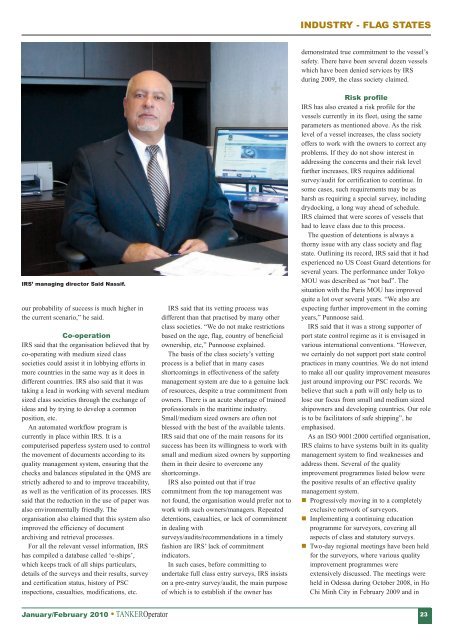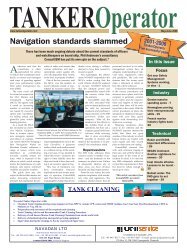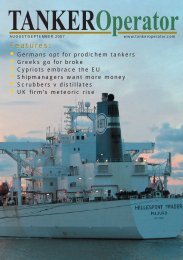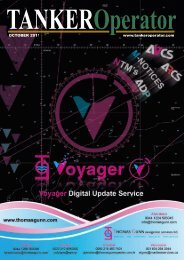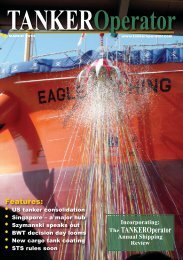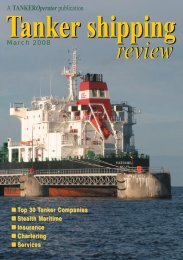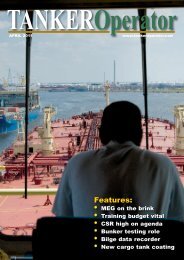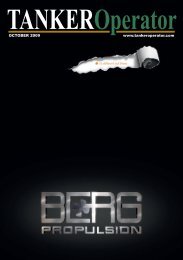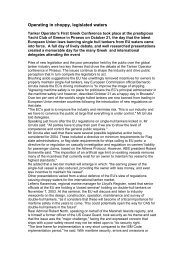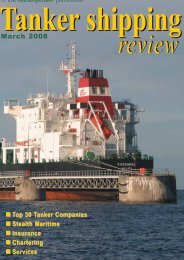Download - Tanker Operator
Download - Tanker Operator
Download - Tanker Operator
You also want an ePaper? Increase the reach of your titles
YUMPU automatically turns print PDFs into web optimized ePapers that Google loves.
INDUSTRY - FLAG STATES<br />
demonstrated true commitment to the vessel’s<br />
safety. There have been several dozen vessels<br />
which have been denied services by IRS<br />
during 2009, the class society claimed.<br />
IRS’ managing director Said Nassif.<br />
our probability of success is much higher in<br />
the current scenario,” he said.<br />
Co-operation<br />
IRS said that the organisation believed that by<br />
co-operating with medium sized class<br />
societies could assist it in lobbying efforts in<br />
more countries in the same way as it does in<br />
different countries. IRS also said that it was<br />
taking a lead in working with several medium<br />
sized class societies through the exchange of<br />
ideas and by trying to develop a common<br />
position, etc.<br />
An automated workflow program is<br />
currently in place within IRS. It is a<br />
computerised paperless system used to control<br />
the movement of documents according to its<br />
quality management system, ensuring that the<br />
checks and balances stipulated in the QMS are<br />
strictly adhered to and to improve traceability,<br />
as well as the verification of its processes. IRS<br />
said that the reduction in the use of paper was<br />
also environmentally friendly. The<br />
organisation also claimed that this system also<br />
improved the efficiency of document<br />
archiving and retrieval processes.<br />
For all the relevant vessel information, IRS<br />
has compiled a database called ‘e-ships’,<br />
which keeps track of all ships particulars,<br />
details of the surveys and their results, survey<br />
and certification status, history of PSC<br />
inspections, casualties, modifications, etc.<br />
IRS said that its vetting process was<br />
different than that practised by many other<br />
class societies. “We do not make restrictions<br />
based on the age, flag, country of beneficial<br />
ownership, etc,” Punnoose explained.<br />
The basis of the class society’s vetting<br />
process is a belief that in many cases<br />
shortcomings in effectiveness of the safety<br />
management system are due to a genuine lack<br />
of resources, despite a true commitment from<br />
owners. There is an acute shortage of trained<br />
professionals in the maritime industry.<br />
Small/medium sized owners are often not<br />
blessed with the best of the available talents.<br />
IRS said that one of the main reasons for its<br />
success has been its willingness to work with<br />
small and medium sized owners by supporting<br />
them in their desire to overcome any<br />
shortcomings.<br />
IRS also pointed out that if true<br />
commitment from the top management was<br />
not found, the organisation would prefer not to<br />
work with such owners/managers. Repeated<br />
detentions, casualties, or lack of commitment<br />
in dealing with<br />
surveys/audits/recommendations in a timely<br />
fashion are IRS’ lack of commitment<br />
indicators.<br />
In such cases, before committing to<br />
undertake full class entry surveys, IRS insists<br />
on a pre-entry survey/audit, the main purpose<br />
of which is to establish if the owner has<br />
Risk profile<br />
IRS has also created a risk profile for the<br />
vessels currently in its fleet, using the same<br />
parameters as mentioned above. As the risk<br />
level of a vessel increases, the class society<br />
offers to work with the owners to correct any<br />
problems. If they do not show interest in<br />
addressing the concerns and their risk level<br />
further increases, IRS requires additional<br />
survey/audit for certification to continue. In<br />
some cases, such requirements may be as<br />
harsh as requiring a special survey, including<br />
drydocking, a long way ahead of schedule.<br />
IRS claimed that were scores of vessels that<br />
had to leave class due to this process.<br />
The question of detentions is always a<br />
thorny issue with any class society and flag<br />
state. Outlining its record, IRS said that it had<br />
experienced no US Coast Guard detentions for<br />
several years. The performance under Tokyo<br />
MOU was described as “not bad”. The<br />
situation with the Paris MOU has improved<br />
quite a lot over several years. “We also are<br />
expecting further improvement in the coming<br />
years,” Punnoose said.<br />
IRS said that it was a strong supporter of<br />
port state control regime as it is envisaged in<br />
various international conventions. “However,<br />
we certainly do not support port state control<br />
practices in many countries. We do not intend<br />
to make all our quality improvement measures<br />
just around improving our PSC records. We<br />
believe that such a path will only help us to<br />
lose our focus from small and medium sized<br />
shipowners and developing countries. Our role<br />
is to be facilitators of safe shipping”, he<br />
emphasised.<br />
As an ISO 9001:2000 certified organisation,<br />
IRS claims to have systems built in its quality<br />
management system to find weaknesses and<br />
address them. Several of the quality<br />
improvement programmes listed below were<br />
the positive results of an effective quality<br />
management system.<br />
Progressively moving in to a completely<br />
exclusive network of surveyors.<br />
Implementing a continuing education<br />
programme for surveyors, covering all<br />
aspects of class and statutory surveys.<br />
Two-day regional meetings have been held<br />
for the surveyors, where various quality<br />
improvement programmes were<br />
extensively discussed. The meetings were<br />
held in Odessa during October 2008, in Ho<br />
Chi Minh City in February 2009 and in<br />
January/February 2010 TANKER<strong>Operator</strong> 23


